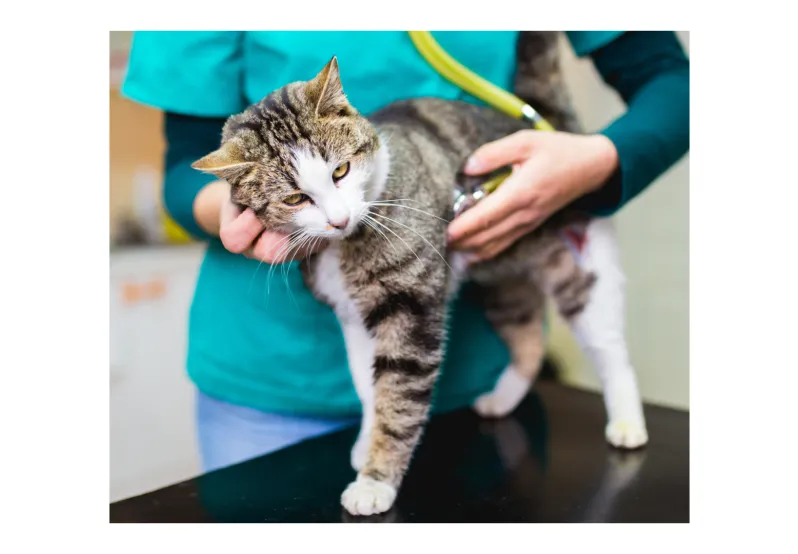The Effect of Transdermal Mirtazapine on Quality of Life in Cats with Chronic Kidney Disease (CKD)
Clinical signs of nausea, vomiting, and dysrexia (abnormal appetite behaviors) are common in feline patients with chronic kidney disease (CKD). Weight loss and loss of lean body mass in these patients is likely attributable to changes in appetite as well as processes such as cachexia (weight loss due to an underlying illness) and sarcopenia (loss of muscle mass and function associated with aging). Poor appetite is perceived as an important aspect of quality of life and can cause significant emotional distress to caregivers. A better understanding of the effect of management of inappetence in CKD on quality of life will improve our ability to help feline patients with CKD. Therefore, the purpose of this study is to assess the effect of appetite stimulation on quality of life in cats with CKD.
What does enrolling my pet in this clinical trial involve?
At the time of screening, your cat will receive a physical examination and comprehensive laboratory screening to confirm stage of CKD and exclude other newly diagnosed conditions. They will then be randomized to receive either mirtazapine transdermal ointment or placebo. Both are an ointment that will be administered transdermally to the inner surface of the ear flap once daily. Cats will be randomized into one of two groups (mirtazapine or placebo) and then switch to the other group after two weeks. We will follow up via phone one-week following enrollment to address any questions or concerns. You will bring your cat back for two recheck visits (Week 2 and Week 4) for a physical exam, blood and urine collection, and blood pressure measurement. From the time of initial screening to the completion of the study, you will be asked to complete the online Vetmetrica Quality of Life survey* - a validated instrument to assess quality of life in cats - on a weekly basis, as well as a daily log of appetite.

Client Compensation:
There is no cost to you for enrolling your cat in this study. The exams and diagnostics performed at enrollment, Week 2 and 4, and the cost of the mirtazapine transdermal ointment medication used, are covered by the study alone. In the unlikely situation that an adverse event that requires treatment occurs as a result of taking part in this study, the cost of treatment will be covered by the study.
Potential Medical Benefits:
Your cat will receive complimentary assessment and management of disease by a board-certified specialist in feline CKD as well as standard of care laboratory monitoring regardless of study group.
Potential Medical Risks:
Your cat may experience transient stress of being in the hospital and mild discomfort of having blood drawn. If your cat is excessively stressed at any time, we will not continue with drawing the study samples. Gabapentin may be given to alleviate stress before proceeding. If this is not effective, we will discuss with you whether continuing the study is in your cat's best interest. A blood draw can result in bruising at the site of the blood draw. In rare cases, using a needle to collect urine directly from the bladder may result in hematuria, nausea or very infrequently bladder rupture. Your cat will be observed closely for side effects and appropriate medical care will be provided. It is possible your cat's condition may not improve or it may worsen. It is possible your cat may not benefit from this study. Results of this study will not be available immediately. The goal of the study is to acquire information that could be beneficial for managing patients with CKD in the future. It is possible that your cat may not benefit directly from this study.
What qualifies my pet for enrollment?
Inclusion Criteria:
- Cats with stable, confirmed IRIS stage 2-3 CKD (serum creatinine ≥ 1.6 - 5.0) measured on two consecutive occasions in conjunction with a USG < 1.035).
- Have not received an appetite stimulant in the last two weeks.
Other concurrent therapies such as therapies for CKD.
- (Subcutaneous fluids are acceptable if they are given consistently throughout the study period and have been started at least 2 weeks prior to enrollment.)
- (Subcutaneous fluids are acceptable if they are given consistently throughout the study period and have been started at least 2 weeks prior to enrollment.)
- Major dietary changes must have been started at least 2 weeks prior to enrollment.
Exclusion Criteria:
- Presence of other uncontrolled systemic illnesses, including those with complications of CKD such as urinary/kidney infection or ureteral obstruction.
- Moderate to severe anemia (PCV < 25%)
- Initiation of other appetite stimulants.
Diagnosis/Condition Being Studied:
Quality of life in cats with chronic kidney disease (CKD)
Intervention to Be Studied:
Mirataz (transdermal mirtazapine)
Primary Outcome:
Event(s) or variable(s) to be measured: Quality of life.
Method(s) used to measure event(s) or variable(s): Measured by an online survey.
Anticipated endpoint/outcome: It is anticipated that cats who received appetite stimulant will have improved quality of life.
PRE-SCREENING QUESTIONNAIRE
If you believe your pet may be eligible for this study, please complete a pre-screening questionnaire.
Contacts:
Dr. Jessica Quimby
Email: Quimby.19@osu.edu
Dr. Jessica Herman
Email: Herman.364@osu.edu
Email: CVM-ClinicalTrials@osu.edu